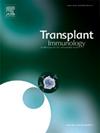Identification of allogeneic and xenogeneic neural stem cells' immunogenicity in the brain and strategies to alleviate transplantation rejection
IF 1.4
4区 医学
Q4 IMMUNOLOGY
引用次数: 0
Abstract
Neural stem cells (NSCs) are a promising therapy for central nervous system (CNS) disorders, yet post-transplant immune rejection critically compromises their survival and efficacy. In this study, we demonstrated the neuroinflammatory responses triggered by syngeneic, allogeneic, and xenogeneic NSCs transplantation, and evaluated the immunosuppressive effects of cyclosporine A (CyA) and methylprednisolone (MP) on graft rejection. Our findings revealed that xenogeneic NSCs transplantation induced infiltration of neutrophils (p < 0.0001), microglia/macrophages (p < 0.0001), CD4+ and CD8+ T cells (p < 0.0001), while allogeneic transplantation primarily triggered microglia/macrophages (p < 0.0005) recruitment. Both transplantation types caused a sharp decline in grafted cell numbers (p < 0.005). Combinatorial CyA and MP treatment significantly attenuated xenogeneic immune rejection and markedly increased surviving graft cells in the brain. Similarly, MP monotherapy effectively reduced allogeneic rejection and enhanced transplanted cell survival. Overall, allogeneic NSCs transplantation primarily triggers innate immunity, while xenogeneic transplantation causes both innate and adaptive immune responses. Accordingly, xenogeneic transplantation required combined CyA and MP therapy, whereas MP monotherapy mitigated rejection in allogeneic transplantation. Our findings may offer a strategy to mitigate transplantation rejection of allogeneic and xenogeneic NSCs in the brain, thereby optimizing the microenvironment for NSC-based therapies in preclinical and clinical applications for various CNS disorders.

同种异体和异种神经干细胞在脑内的免疫原性鉴定及缓解移植排斥反应的策略
神经干细胞(NSCs)是治疗中枢神经系统(CNS)疾病的一种很有前景的疗法,但移植后的免疫排斥反应严重影响了它们的存活和疗效。在这项研究中,我们展示了同基因、异体和异种NSCs移植引发的神经炎症反应,并评估了环孢素A (CyA)和甲基强的松龙(MP)对移植排斥反应的免疫抑制作用。我们的研究结果显示,异种NSCs移植诱导中性粒细胞浸润(p <;0.0001),小胶质细胞/巨噬细胞(p <;0.0001), CD4+和CD8+ T细胞(p <;0.0001),而同种异体移植主要触发小胶质细胞/巨噬细胞(p <;0.0005)招聘。两种移植类型均导致移植细胞数量急剧下降(p <;0.005)。CyA和MP联合治疗可显著减轻异种免疫排斥反应,并显著增加脑内移植细胞的存活。同样,MP单药治疗有效地减少了异体排斥反应,提高了移植细胞的存活率。总的来说,异体NSCs移植主要触发先天免疫,而异种移植引起先天和适应性免疫反应。因此,异体移植需要CyA和MP联合治疗,而MP单药治疗可减轻异体移植的排斥反应。我们的研究结果可能提供一种策略来减轻大脑中异体和异种NSCs的移植排斥反应,从而优化基于NSCs的治疗在临床前和临床应用于各种中枢神经系统疾病的微环境。
本文章由计算机程序翻译,如有差异,请以英文原文为准。
求助全文
约1分钟内获得全文
求助全文
来源期刊

Transplant immunology
医学-免疫学
CiteScore
2.10
自引率
13.30%
发文量
198
审稿时长
48 days
期刊介绍:
Transplant Immunology will publish up-to-date information on all aspects of the broad field it encompasses. The journal will be directed at (basic) scientists, tissue typers, transplant physicians and surgeons, and research and data on all immunological aspects of organ-, tissue- and (haematopoietic) stem cell transplantation are of potential interest to the readers of Transplant Immunology. Original papers, Review articles and Hypotheses will be considered for publication and submitted manuscripts will be rapidly peer-reviewed and published. They will be judged on the basis of scientific merit, originality, timeliness and quality.
 求助内容:
求助内容: 应助结果提醒方式:
应助结果提醒方式:


